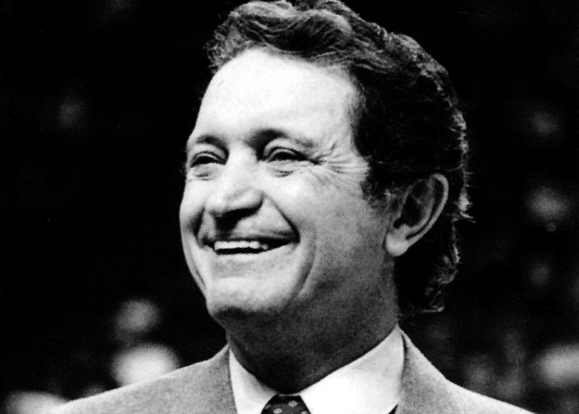On January 26 the sports and television world lost one of its true champions. Known as “the James Joyce of the airwaves,” sportscaster Al McGuire passed away in his Milwaukee home surrounded by his loved ones.
McGuire’s renown as former coach of the Marquette Warriors basketball team, and later NBC then CBS commentator for the NCAA basketball tournament, was matched only by his way with words. He coined such terms as “aircraft carder” (a big man in the middle) and “white-knuckler” (a very close game) which are now regularly used in sports vocabulary. Known for his one-liners, one of his most memorable was in response to a comment made by Billy Packer, his NBC co-announcer and off-air friend/on-air thorn-in-his-side. Packer was referring to 300 pound North Carolina center Geoff Crompton’s loss of 15 pounds of weight when McGuire spurted, “That’s like the Queen Mary losing a deck chair.”
Al’s wit no doubt had to do with his upbringing. His father, John, of Lough Key, Co. Roscommon and mother, Mary Sullivan of Hertfordshire, England emigrated to the U.S., settling in Rockaway Beach, New York. His father owned McGuire’s Bar, and Al and his brothers Dick (former Knick) and John Jr. were raised in it, working as bartenders. Al learned about hard work and dedication from his father. Friends recall John Sr. cleaning the beer lines once a week as opposed to the twice yearly of the other pubs lining the street.
This hard work and hands-on commitment is evident in McGuire’s recollection of his time at Belmont Abbey, a small school in North Carolina where he began his coaching career, and where he says he really learned to coach: “That’s where I drove the bus, picked up the towels, wrapped the ankles. There’s no one who’s dropped on the mountain; you’ve got to work your way to the top.”
McGuire began his climb to the top as captain of the St. John’s basketball team, which led to three seasons with the New York Knicks (1951-54) and a brief career with the Baltimore Bullets (1954-55). The climb was steep, perhaps a bit too steep; despite his efforts, McGuire only averaged 3.9 points a game. Later, he would proclaim himself as “the worst player in pro ball.”
But it was his unsatisfying record as a player that would lead McGuire to his true talent: coaching. He was assistant coach at Dartmouth before becoming head coach at Belmont Abbey and then went on to the Marquette Warriors.
McGuire utilized his keen eye, probably also gleaned from working for his father, who would make him rewash every glass if but one was found with lipstick on its rim. McGuire was a gifted recruiter. Growing up where, as he said, “my world was cracked pavement,” Al often went back to New York, into bad neighborhoods to find his star players for Marquette. That’s where he spotted major players like George Thompson, Dean “The Dream” Meminger and Butch Lee.
At Marquette his teams compiled a 295-80 record and won 20 or more consecutive games for 11 consecutive seasons. In 1970, McGuire declined a bid to the N.C.A.A. because he was unhappy with the bracket his team was put in. It was the last time a school turned down an N.C.A.A. bid. Marquette went on to win the N.I.T. and under McGuire’s coaching made it to the N.C.A.A. finals in 1974 for the first time where they lost to the undefeated North Carolina State team. McGuire brought the Warriors back to the finals in 1977 to face the Tarheels. McGuire’s last-minute strategy won them the championship. Following the victory, McGuire cried into his hands; it would be the last game he coached.
Despite his love for the game, McGuire had had enough. He joined NBC the following year.
McGuire’s eloquence quickly became legendary. ESPN-ABC broadcaster Dick Vitale called him “a television genius with incredible communication skills.” McGuire lent these skills to others as an accomplished motivational speaker but he didn’t let it get to his head. In his 23 years commentating, he never watched himself on television. When he was elected to the Hall of Fame in 1992 he felt bad that his brother Dick had not been (he was elected the following year). Bob Costas called him “a genuine original …of a time when there were real characters…not packaged images.” The title of McGuire’s biography says it all: You Can Call Me Al.
Retiring last March, McGuire only said he had a form of anemia. His brother Dick denied reports that he had leukemia, and statements from the family did not disclose the cause of death. Al McGuire is survived by his wife of 50 years, Patricia; two sons, Al and Robert; a daughter Noreen; his brother Dick, and six grandchildren. ♦


Leave a Reply